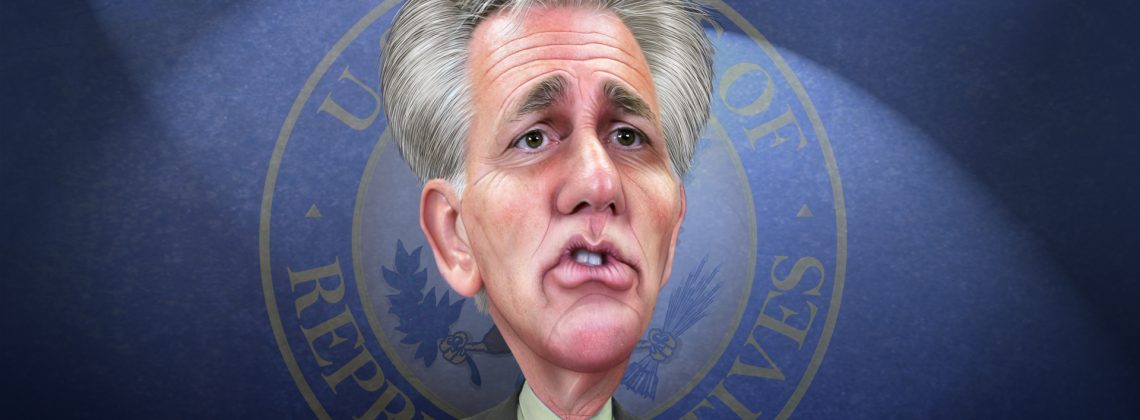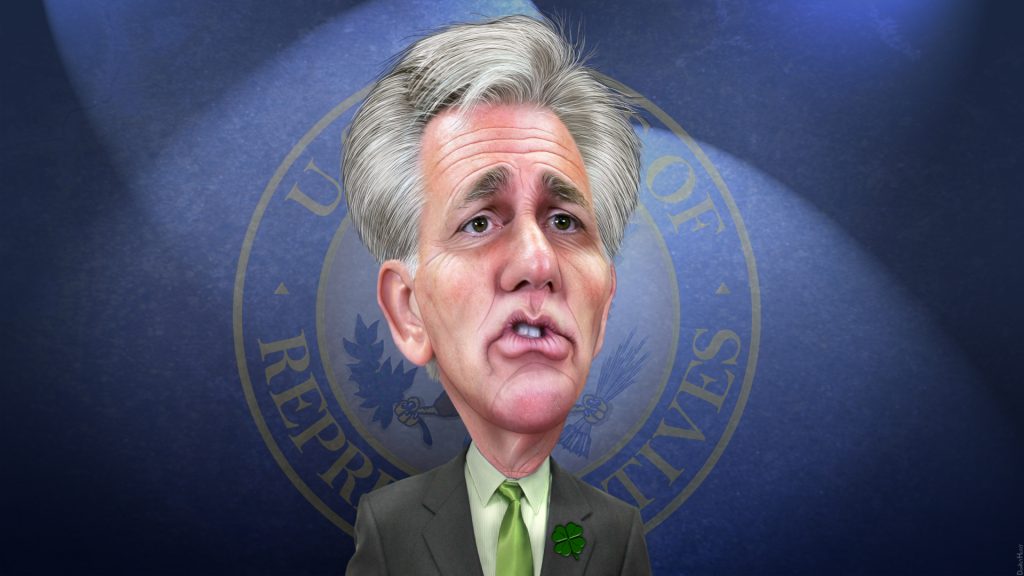

Much of the new Speaker’s first speech was delivered in a vacuum
Kevin McCarthy waited his entire life for this moment. On the morning of Saturday, January 7, 2023 at precisely 1:14 a.m. EST, the California congressman took the gavel and delivered his first speech as Speaker of the House of Representatives. It took four days of voting and fifteen ballots to elect McCarthy to this post, but there he was, standing at the lectern casting a vision for America.
Some of the speech was boilerplate—the requisite appeals to American values that a politician of any party would say in such an address. McCarthy talked about the American dream, improving the economy, working for ordinary Americans, and national unity. He quoted Abraham Lincoln: “We are striving to maintain the government and institutions of our fathers and to transmit them to our children and our children’s children forever.” Art historians might quibble with McCarthy’s interpretation of Emmanuel Luetze’s painting Washington Crossing the Delaware, but at least he understood that it was not an accurate representation of what happened on Christmas Day 1776.
Ironically, it was McCarthy’s run-of-the-mill references to American ideals that made his speech so shocking. The values to which McCarthy appealed seemed to exist outside of time and space, as if he was delivering the speech in a vacuum. McCarthy spoke as if the events of the past two years had never happened.
John Hope Franklin famously said that historians are the “conscience of the nation.” Indeed, when future historians write about McCarthy’s speakership they will not miss the fact he was elected during a session that began on the two-year anniversary of January 6, 2021, the day of the historic insurrection in the U.S. Capitol. On that afternoon members of the United States House of Representatives were wearing gas masks and running for their lives. Yet McCarthy never mentioned the events of January 6th in his speech. Nor was this dark moment in American history mentioned by any other Republican speaker who took the microphone earlier in the session.
McCarthy’s speech even included a line about respecting law enforcement and prosecuting criminals. I am guessing that the Capitol Police and Donald Trump (whom the January 6th Committee concluded is guilty of crimes related to the role he played in instigating the riots) never crossed McCarthy’s mind as he uttered these words. McCarthy was quick to reference George Washington and Abraham Lincoln, but when it came to the insurrection he appeared to have developed a case of historical amnesia.
Future historians will point out that McCarthy empowered the members of Congress who gave fuel to the false claim that the 2020 presidential election was stolen. McCarthy welcomed them into the GOP’s fold because he knew he might need their votes for Speaker one day. And when that day came, he was forced to make concessions to twenty far-right members of Congress, several of whom could only muster a “present” vote for the power-hungry son of Bakersfield. McCarthy said the concession and deal-making necessary to win their votes was an example of democracy at work. “Democracy is messy,” McCarthy told reporters. Perhaps. Or perhaps McCarthy was simply held hostage by the most anti-democratic wing of his party—a motley collection of election deniers, anti-vaxxers, and MAGA Republicans who want to spend the next two years investigating Hunter Biden’s laptop, making appearances on pro-Trump media outlets, and holding a proverbial gun to the Speaker’s head.
McCarthy gave credit to former president Donald Trump for his victory. Historians, of course, will remember that on January 6th, 2021 McCarthy was hiding in his office on the phone with Trump begging him to call off the dogs. These historians will note McCarthy’s January 13th speech from the House floor in which he said Trump “bears responsibility” for the insurrection. And then they will recall how two weeks later McCarthy flew to Mar-a-Lago to win back the former president’s approval—a move journalists and pundits have described as “kissing the ring.”
Of course, not all of McCarthy’s speech echoed lofty American ideals that transcend political partisanship. He also gave us a glimpse of what we can expect from the Republican leadership of the 118th Congress. Despite the GOP’s thin majority in the House, McCarthy spoke as if he were Schuyler Colfax, the Republican speaker in the 40th Congress (1867-1869) whose party enjoyed a 173-47 advantage over the Democrats.
McCarthy said that he planned to give full attention to the “origins of COVID” (a reference to a conspiracy theory suggesting that the virus was created in a lab by Chinese communists with nefarious intentions and that Anthony Fauci had something to do with it) and the “weaponization of the FBI” (a reference to the FBI search for classified documents at Mar-a-Lago). He wants to take “woke indoctrination” out of schools and repeal funding for 87,000 new American jobs in the woefully understaffed Internal Revenue Service. Good luck with all that, Kevin.
Upon learning that the Trump-loving McCarthy had won the speakership, Liz Cheney, the former Wyoming congresswoman and vice-chair of the January 6th commission, tweeted Donald Trump’s December 27, 2020 words to acting attorney general Jeffrey Rosen: “Just say the election was corrupt and leave the rest to me and the Republican congressmen.” Mission accomplished.
McCarthy also plans to open the House chamber to all visitors. Maybe the QAnon Shaman will come back to Washington after he finishes his forty-one months in prison. Who knows, he may return as a member of Congress.
John Fea is Executive Editor of Current